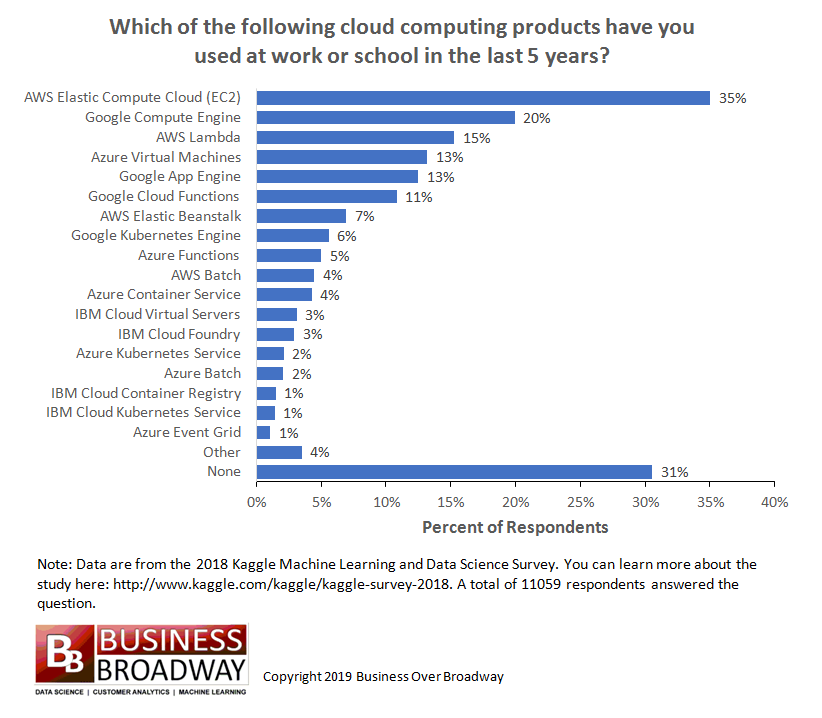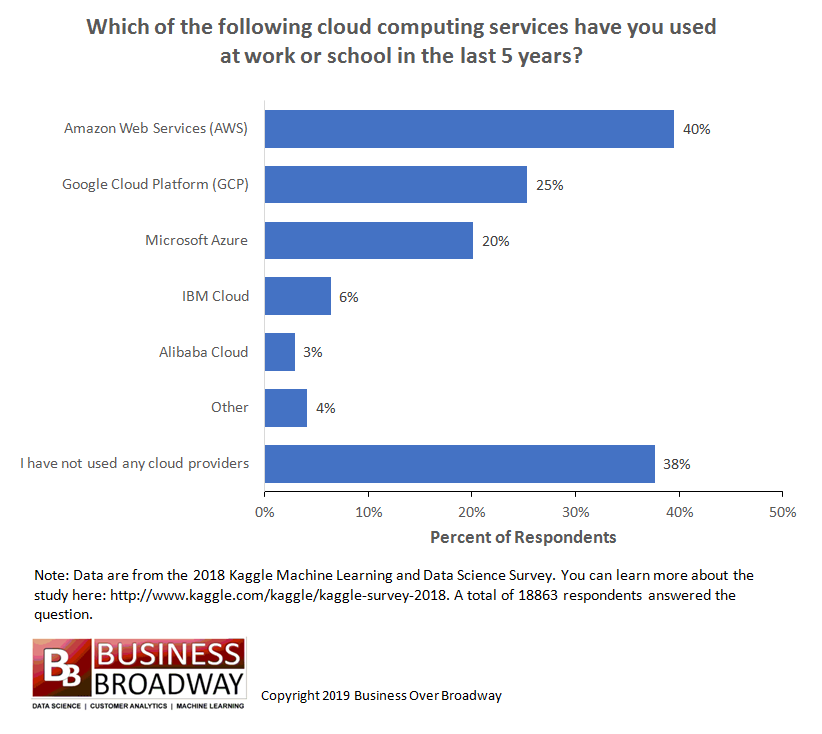A recent survey revealed that 69% of data pros have used at least one cloud computing product in the last 5 years while 62% of data pros have used at least one cloud computing service in the last 5 years. The most popular cloud computing products include AWS Elastic Compute, Google Cloud Engine and AWS Lambda. The most popular cloud computing services include Amazon Web Services, Google Cloud Platform and Microsoft Azure.
The practice of data science often include the use of cloud computing products and services to help data professionals access the resources needed to manage and process data. To better understand the adoption of these tools, I examined data from a recent worldwide study by Kaggle. This survey study of 23,859 data professionals was conducted in October of 2018 (2018 Machine Learning and Data Science Survey). This survey included a variety of questions about data science, machine learning, education and more. Kaggle released the raw survey data and many of their members have analyzed the data (see link above).
Most Popular Cloud Computing Products
The survey included a question, “Which of the following cloud computing products have you used at work or school in the past 5 years? (Select all that apply).” Thirty-one percent of data professionals surveyed said they did not use any cloud computing products in the past 5 years. On average, data professionals have used one (median) cloud computing product in the past 5 years. As seen in Figure 1, the top cloud computing products AWS Elastic Compute Cloud (35% of respondents said they used this product), followed by Google Compute Engine (20%) and AWS Lambda (15%). The top 10 cloud computing products are rounded out by Azure Virtual Machines, Google App Engine, Google Cloud Functions, AWS Elastic Beanstalk, Google Kubernetes Engine, Azure Functions and AWS Batch.
Of the data professionals who identified as a data scientist as their job title, 50% used AWS Elastic Compute Cloud, 42% used Google Compute Engine and 38% used AWS Lambda.
Most Popular Cloud Computing Services
Next, I looked at adoption rates of cloud computing services. The survey asked respondents, “Which of the following cloud computing services have you used at work or school in the last 5 years (see Figure 2). Results showed that about 62% of data professionals used at least one cloud computing service in the past 5 years. On average, data pros used only one (median) cloud computing service in the past 5 years.
Adoption rates for cloud computing services are slightly lower than adoption rates for ML frameworks. The most popular ML products were Amazon Web Services (40%), Google Cloud Platform (25%) and Microsoft Azure (20%). The remaining top two cloud computing services used are IBM Cloud (6%) and Alibaba Cloud (3%).
When looking at data professionals who had the job title of data scientist, nearly 60% of them have used an ML product in the past 5 years, with the top 3 adopted cloud computing services being Amazon Web Services (50%), Google Cloud Platform (47%) and Microsoft Azure (45%).
Summary
Data professionals tend to use cloud computing products at a significantly higher rate than cloud computing services. The most popular cloud computing products, by far, was Amazon Elastic Compute Cloud, followed by Google Compute Engine and AWS Lambda. The most popular cloud computing service were, in order, Amazon Web Services, followed by Google Cloud Platform, Microsoft Azure, IBM Cloud and Alibaba Cloud.
I am excited to be attending the annual IBM Think 2019 technology conference later this month (Feb 12-15) in San Francisco to learn about what IBM is doing in the area of analytics and cloud computing. If you are going to attend the event, please let me know if you’d like to meet up for a drink and conversation.
(Disclosure: IBM is assisting me with travel expenses to IBM Think 2019.)





